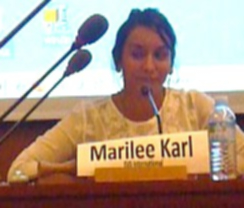- Details
Cai Yiping
Peace Journalism (also called conflict solution journalism, conflict sensitive journalism) has been developed from research that indicates that all too often news about conflict has a value bias toward violence. Peace journalism also includes a practical methodology for correcting this bias by producing journalism in both the mainstream and alternative media; and working with journalists and other media professionals, audiences and organizations in conflict.1
- Details
Cai Yiping (Isis International)
No Climate Justice without Gender Justice: The Urgency of Engendering Climate Justice
Climate change is a reality that is faced by people and countries in various ways. Some of its effects have been the increasing numbers and intensity of typhoons and the long seasons of drought that have challenged food production, sanitation and have caused increasing health problems. The impacts of climate change aren’t gender neutral. Men and women experience and are affected by climate change differently. This is because of existing gender inequalities, which affect all aspects of social life, make their way into the effects of climate change.
- Details
World Rural Women’s Day, 15 October
Isis International joins in celebrating World Rural Women’s Day by sharing with you the statement of FemLINKPACIFIC.
FemLINKPACIFIC Statement for Rural Women’s Day 2011
11 October 2011
“Rural Women’s Day 2011 should be more than just about advocating for a gender inclusive development agenda. Rural Women’s Day 2011 should enable the diverse experiences of rural women to inform solutions and actions to define their peace and human security. This includes enabling information and communication channels to addressing peace and development priorities which also include the new and emerging threats to Peace in the Pacific including the impact of climate change, tensions over access to water, land and other diminishing resources,” says the convenor of the a rural women’s media and policy network in Fiji.
Read more: FemLINKPACIFIC Statement for Rural Women’s Day 2011
- Details
(Plenary address delivered at the 11th International Women's Health Meeting, Brussels, Belgium, September 15, 2011)
Permit me a moment of personal sharing. Before I left the Philippines, Senator Vicente Sotto, during his interpellation of a proposed bill to ensure reproductive health services in the country, projected the website of the Women's Global Network for Reproductive Rights (WGNRR). He chose particularly that part of the website which discusses abortion. He added that Dr. Sylvia Estrada Claudio is the Chair of WGNRR, and that she has been seen frequently with the authors of the reproductive health bill.
Read more: The International Women's Health Movement in the Era of Globalization
- Details
September 21, 2011
Palais des Nations
Paper by Marilee Karl - Co-Founder Isis International, Honorary Chairperson Isis International-Manila Board of Trustees
(presented by her daughter, Alice Foubert-Hagenbach)
 Isis International would like to thank the organizers for inviting us to participate in this panel on women and the right to water. We want to share a few experiences of women in the Isis International network. We are eager to learn from the other organizations here. We hope that together we can strengthen the struggle of women worldwide for the right to water.
Isis International would like to thank the organizers for inviting us to participate in this panel on women and the right to water. We want to share a few experiences of women in the Isis International network. We are eager to learn from the other organizations here. We hope that together we can strengthen the struggle of women worldwide for the right to water.
- Details
By Sonia Randhawa, Director, Centre for Independent Journalism, Malaysia
Women are claiming a leading role the political reform movement in Malaysia. In July this year, around 50,000 Malaysians braved a massive state-sponsored onslaught against freedom of expression and freedom of assembly to gather in the nation's capital to demand electoral reform. It was the second time that Malaysians gathered in a mass rally to demand these reforms, but the first time that the call was led by a woman, Ambiga Sreenevasan, and where the lead organisation was a women's rights NGO, Empower. This put gender directly in the spotlight of the Bersih movement. Bersih means 'Clean' in Malay, and was the name given to the movement for electoral reform.
Page 22 of 62





 The
The 
 Isis Resource Center holds one of the largest feminist collections of materials in the Global South. With 40 years of publication experience, Isis holds a vast collection.
Isis Resource Center holds one of the largest feminist collections of materials in the Global South. With 40 years of publication experience, Isis holds a vast collection.